Subscriber Benefit
As a subscriber you can listen to articles at work, in the car, or while you work out. Subscribe NowAlthough the stark realities of racism once highlighted by “colored only” signs are gone, the killings of African Americans including Breonna Taylor in Louisville and George Floyd in Minneapolis by law enforcement have shown the United States is still a separate and unequal country.
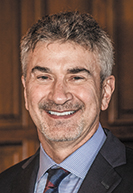
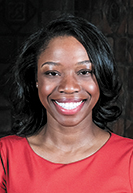
The outrage and outcry that has continued since the spotlight was thrown on modern-day racial discrimination is bringing a reckoning that Indianapolis attorney Angka Hinshaw believes America may not have seen since the civil rights movement of the 1960s. And in the upheaval, she sees the possibility for change.
“This time we have more people uniting and saying something is wrong with what is happening to people of color,” she said.
To capitalize on the talks and ruminations that started spontaneously during 2020, Hinshaw is joining Indiana Justice Steven David to lead a yearlong discussion about racial issues and cultural differences. The goal of the program, Open Conversations, is to foster honest, perhaps uncomfortable, dialogue where the participants can gain new insight and understanding.
Sponsored by the Indiana Supreme Court, the series is being hosted and facilitated by the Indiana State Bar Association. Also, law schools, law firms and bar associations across the state are supporting the initiative.
The format of each conversation will change month to month, with different guests being welcomed to each discussion and the participants being able to ask questions and share their stories. David and Hinshaw emphasized the programs will not be lectures or dialogues that are judgmental and hostile.
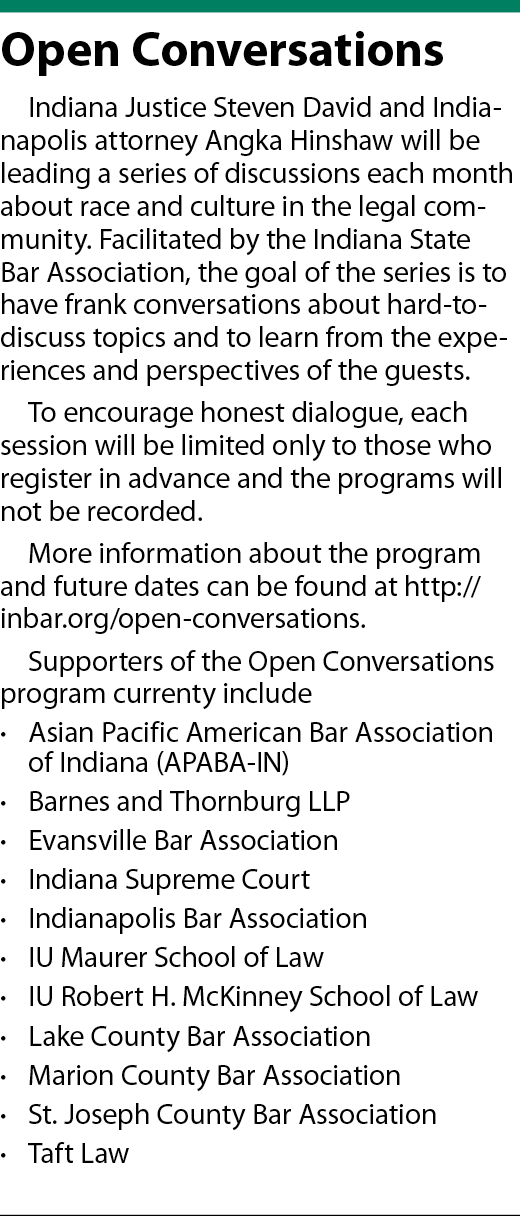 Rather, the focus is on enabling the participants learn and grow.
Rather, the focus is on enabling the participants learn and grow.
“I think our program will definitely advance the conversation about racism and move people to take better action and to recognize the bias in situations,” Hinshaw said. “… Our world, our society, our profession is not going to get better if we’re not taking action and being accountable to other people who are marginalized.”
David was reminded of the power of talking last year while exercising with his nephew. During the run, the young father of two boys told his uncle about his friends at work who have to teach their sons a different way to grow up because they are minorities. The Indiana justice is still struck as he recalled how his nephew agonized over the unfairness and injustice that families of color face.
“We’re just one of many different conversations, one of many calls to action,” David said of the Open Conversations series. “If we can help someone in their personal growth, that will translate, hopefully, to collective progress because people together can do so much more than one individually.”
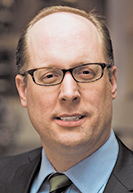
Conversations in law schools
Indiana University Maurer School of Law and Indiana University Robert H. McKinney School of Law are both partners in the Open Conversations program.
IU Maurer Dean Austen Parrish welcomed the invitation to support the initiative, saying it was a “no-brainer.” He applauded the Supreme Court and state bar association for developing the series and said students will benefit from taking part in the legal community’s conversation about systemic racism.
“I think just listening and learning more about what those experiences are, how that’s impacted people, makes people more empathetic, more willing to think about how things can be different,” Parrish said.
IU Maurer took a deeper look at racial inequity during the fall semester in the hopes of sparking conversations and bringing more understanding. The Bloomington school joined with other law schools in the Big Ten to launch a 12-week speaker series on race, law and equality. Every Tuesday evening a professor from one of the institutions would present a lecture related to the focus of the series.
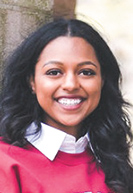
Ashley Scurlock, a second-year student and member of the Black Law Students Association at IU Maurer, helped coordinate the event. She was surprised by the interest in the series not just from the students and faculties in the law schools but also from members of the local communities.
For her, the people who tuned in to hear the lectures are reflective of the new energy that is causing more people to speak up about racial tension and inequality. Scurlock said she and her classmates were introduced to fresh perspectives they had never considered, such as racial issues in rural communities and how today’s judicial system still carries the imprint of slavery.
The series underscored the importance of not rejecting the opportunity to learn.
“Just keep your eyes open, your ears open even if something sounds like it might not fit into the category you thought it was going to,” Scurlock said. “There could be a really, really good lesson that will expand your knowledge.”
Words and actions
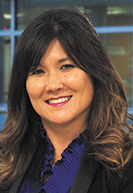
Like Hinshaw, Patricia Kinney, assistant dean of diversity and inclusion at IU McKinney, hears more conversations and sees more people talking about racial inequality because of the events in 2020.
A greater number of people are becoming aware of the issues and obstacles that people of color have long been facing and, through the conversations, they have the opportunity to deepen their understanding, Kinney said. But for society to progress, action must accompany the words.
The conversations must keep happening with everyone taking part, actively listening and contributing rather than merely listening to responses and asking the marginalized, “OK, what can we do to help?” People also must take time for self-work and self-study.
“My hope is for more action,” Kinney said. “There’s a lot of work to do after this summer. … This can’t be something that fades away when the next thing happens.”
Hinshaw knows the power of conversation. Within communities of color, she said, people gain strength and encouragement by talking and sharing their experiences with one another. Now fueled by the ongoing outcry for equity, she sees the potential to broaden those conversations to a wider and more diverse group.
And she, too, wants the discussions to lead to action. She hopes people become more aware of biases, expand their social and professional circles to include those who do not look like them, and speak up when they see something that is wrong.
Hinshaw described herself as an optimist who is also realistic and rational. She has hope the Open Conversations series will help remove the more subtle signs of racism in society.
“I just feel called,” she said. “This is something I want to do so my children and their children have a better opportunity and less struggles.”•
Please enable JavaScript to view this content.
